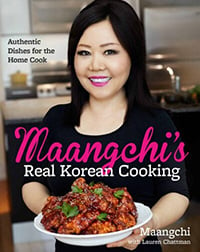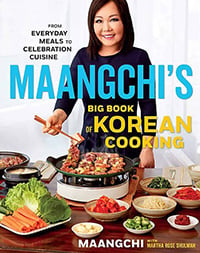“Which is best for Korean cooking? Kosher salt, sea salt, or table salt?”
Many of my readers ask me which kind of salt they should use in Korean cooking. In the Korean grocery store they see many different kinds of salt at different prices, and they wonder which one they need to buy. They also ask me if they need to buy only Korean salt to make Korean food.
The short answer is: You can use any salt sold in any grocery store to make Korean food.
From left: table salt, kosher salt, and sea salt
They are all salt, what makes them different is mostly the size and texture of the grains. Table salt is small and granular. Kosher salt is larger, and sea salt is large and flaky.
Almost all Koreans use sea salt for making kimchi, fish sauce, hot pepper paste (gochujang), and fermented bean paste (doenjang), and a less granular Korean brand for everything else. When I lived in Korea, I did too. I would buy a big straw sack of sea salt that would last a year. I’d need to let it sit a bit and let some of the mineral-rich seawater drip out of the bottom of the salt sack. Until that happened, the salt was a little bitter. We all thought sea salt was necessary to make some dishes.
Sea salt
When I first lived in America in 1990s, Korean sea salt was available at a nearby Korean grocery store but it was expensive . I really wanted to buy only one kind of reasonably-priced salt and use it for everything: Korean and non-Korean cooking. As an experiment I bought some Morton table salt and made kimchi with it. The kimchi turned out perfect, just as good as kimchi made with Korean sea salt!
It was time for me to stop using Korean sea salt.
Iodized salt (table salt)
I later learned that all salt – sea salt, table salt, Kosher salt – is chemically the same. There might be some trace minerals on them but basically salt is salt.
When I started making recipes for my website (and later for my cookbook), I decided to use one kind of salt so readers could easily follow my recipes and wouldn’t need to buy different kinds of salt for different dishes. Something reasonably priced and easy to find in grocery stores. I chose Kosher salt.
It’s pretty cheap and pretty easy to find, and I like the way it is dissolved fast and it feels in my hands when I sprinkle it. A little chunky and big, it feels good in my fingers and spreads well.
You can use any other kind of salt you want that’s readily available to you, it doesn’t need to be fancy or expensive or purchased at a special store. The only thing you have to be aware of if you don’t use kosher salt is that you’ll need to adjust the amount of salt you use when following my recipes. The grains of table salt are smaller, so a cup of table salt is more concentrated. You can use less. And sea salt is large and coarse, so you’ll need to use more of it.
When making Korean food, don’t worry about having the right salt or not. Use what you have around, experiment, and have fun! Happy cooking!









I know you said “all salt is salt”, but I was wondering if using Hawaiian salt would be like Korean sea salt? It’s made from evaporated seawater but has alaea(an iron oxide red clay with a slight metallic taste) added to it, so would I use the same amount as Korean sea salt as in the recipe? Or is it more of an “adjust to my own taste” kinda thing? My great grandfather and family came to hawaii from South Korea during the late 1800’s, but didn’t have any recipes handed down to the future generations, so I’m looking for some that I could learn to teach my children and grandchildren with, and yours look like the perfect jumping off point to start with. Btw thank you for making an easy to follow recipe with pictures and text, some other sites just have text and don’t exactly get specific- just add this and that and your done!
As a friendly reminder, the main difference between salt (sodium-chloride) is crystal size, if there are any additional minerals, and whether there is an anti-caking agent, such as calcium-silicate, included. Table salt almost always includes an anti-caking agent that can cause the liquid in pickles to turn cloudy. For this reason table salt is not a good choice for pickling.
Sometimes there is an anti-caking agent in kosher salt, most of the time there is not. You need to check the label. What makes kosher salt unique is the larger crystal size intended for use with meats. For this reason kosher salt is best measured by weight, not volume. Oh, and kosher salt (actually, koshering salt) is spelt with a small ‘k’ because it refers to the use of large crystal salt to yield meats Kosher for consumption. It is not a reference to a Kosher food, though it may also be certified as such.
Sea salt can be large crystals or ground to a uniform small crystal, like the sea salt sold by Costco. Sea salt also contains minerals in addition to just salt. Some people prefer this salt for fermenting foods such as kimchi. The idea is to include trace minerals with the pro-biotic benefits of fermenting for a more nutritional food.
Pink salt and black salt obviously includes additional chemicals. Pink salt is mined in the Middle East (and I believe also Japan) and contain a chemical that I forget. It is about 95% salt 5% other chemicals. Black salt is simply sea salt that is blended with charcoal for aesthetic reasons. Note: the term ‘pink salt’ can also apply to salt blended with sodium-nitrite, an anti-bacterial agent used in curing meats. Salt with sodium-nitrite, if not used properly, can be harmful, even deadly.
Personally, I use Costco’s sea salt for everything except pickling or fermenting. For pickles or fermenting I use Diamond Crystal brand of kosher salt because it is only sodium-chloride without any anti-caking additives. This brand is a common and readily available almost anywhere in the U.S. Because of its purity it used extensively for making cured meat products.
Maangchi, thank you for your wonderful site. You are a treasure!!
Very interesting, thank you, Mangchi. xxx
Thanks for the story, Maangchi! Kosher salt is a great balance in size and texture (not to mention price!).